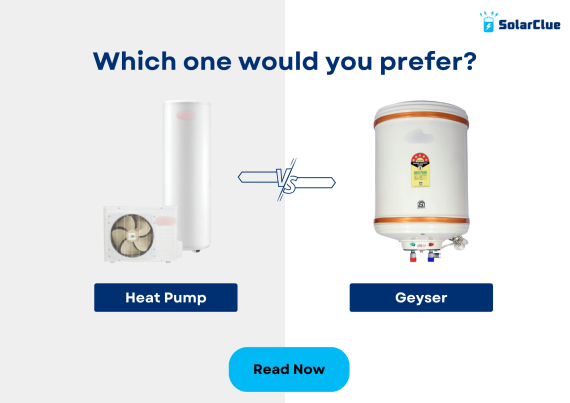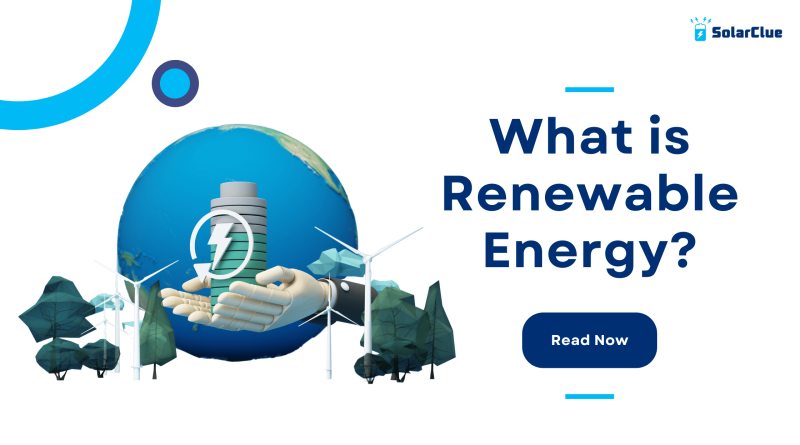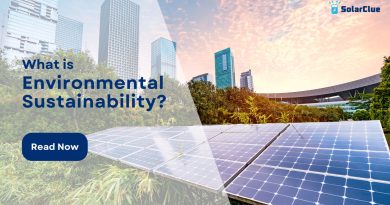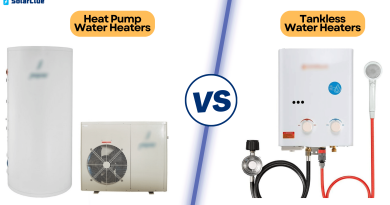What is Renewable Energy?
India needs to adopt renewable energy appliances to reduce cost and environmental hazards. But what is renewable energy? It is the form of energy which helps in reduction of carbon footprint and greenhouse gas emissions. This is sustainable and will never run out.
In this blog, we will discuss about renewable energy, its benefits and how a heat pump uses renewable energy to heat water. Let’s get started.
Table of Contents
Renewable Energy Meaning
Renewable energy refers to energy sources that are constantly resupplied by natural processes and are virtually limitless, such as solar, wind, geothermal, and hydropower. These sources are considered clean and sustainable, as they produce little or no greenhouse gas emissions during their operation. This makes them a better alternative to those appliances which involves burning of fossil fuels to run efficiently.
Benefits of Renewable Energy
There are many benefits of renewable energy sources. Some of them are listed below:
1. Clean and Environment Friendly
Renewable energy is clean green power! Solar, wind and hydroelectricity use natural sources. No burning of dirty fossil fuels. Renewables don’t pollute the air, water or land. They are eco-friendly and preserve our natural environment.
2. Prevent Emission of Harmful Pollutants
Fossil fuels release greenhouse gases, particulate matter and toxic gases. This causes smog, acid rain and climate change. Renewables produce little to no emissions during operation. They improve air quality and public health.
3. Sustainability
Fossil fuels are finite and will eventually run out. Renewable sources are continuously replenished through natural cycles of the sun, wind and water flow. They are inexhaustible and sustainable for future generations.
4. Reduces Dependency on Fossil Fuels
Fossil fuel is a non-renewable source of energy. It is limited. If we are using it too much, nothing will be left for the future generation. So it is important to reduce the dependency on fossil fuels. We must adopt renewable energy sources.
5. Cost-Effective
Installing renewable power initially requires investment. But operating costs are extremely low with free fuel sources like sunlight and wind. Electricity from renewables is increasingly cheaper than fossil fuels.

We use appliances which consume huge electricity. Electricity is produced by burning of fossil fuels. Fossil fuel is a non-renewable energy. It is limited. Not just that, it also results in pollution, global warming, and other environmental issues. It is time that we adopt appliances which use renewable energy. This will also help you reduce your monthly electricity bills.
One such appliance is a heat pump. It uses heat from ambient air rather than using electricity to heat water. Let’s understand heat pumps in detail.
What is a heat pump?
A heat pump is a water heating device, to meet your daily hot water needs. It is energy-efficient, as it uses less electricity than other traditional water heaters. The difference lies in the working principle. Any traditional water heater, like a geyser, uses direct electricity to heat water. Whereas, a heat pump uses electricity to only transfer heat from one place to another. This heat is used to produce hot water, rather than electricity. A heat pump is one of the best sustainable ideas for the future.
How does a heat pump system work?
A heat pump works on the principle of transferring heat from one place to another.
This system consists of two main components: an indoor unit and an outdoor unit.
The outdoor unit has two parts – an exhaust fan and a compressor. And the indoor unit is the storage tank, where water is stored.
The exhaust fan absorbs heat from the surrounding air, while the compressor compresses the refrigerant gas, increasing its temperature. This heated refrigerant gas then passes through a spiral condenser inside the indoor unit, transferring its heat to the water stored in the tank. This process continues until the desired water temperature is reached.
Unlike traditional geysers that use a significant amount of electricity to generate heat, heat pumps consume less energy by simply moving heat from one place to another. This makes them more energy-efficient and cost-effective in the long run.
Does heat pumps use renewable energy?
Yes, heat pump water heaters do utilize renewable energy. While they require a small amount of electricity to operate the compressor and fan, the majority of the energy they use comes from the heat absorbed from the surrounding air, which is a renewable and abundant source of energy. In fact, heat pump water heaters are considered to be up to 90% renewable, making them an excellent choice for those looking to reduce their carbon footprint.
What are the other benefits of heat pumps?
In addition to their environmental benefits, heat pumps offer several other benefits:
1. Cost-Effective
Heat pumps have high upfront cost. However, they make up for it through lower operating costs. Heat pumps transfer heat rather than generating it directly. This uses far less electricity – up to 75% less. Over its 10-15 year lifespan, a heat pump can save you hundreds or even thousands in energy costs. So it is actually a cheaper alternative to other traditional water heaters like geysers.
2. Long Lifespan
With proper maintenance, heat pumps last 15 years or more – significantly longer than standard electric geysers (8-10 years). So there is no need for replacement for a long time. This extended life cycle also contributes to it being a cost-effective option.
3. Reduced Water Wastage
Traditional water heaters constantly heat and reheat the same water, leading to significant energy losses. Heat pumps heat water more efficiently, so you don’t have to run the tap as long waiting for hot water. This conserves water, especially in households with long pipe runs.
4. Efficient in Cold Climates
One common misconception about heat pump water heaters is that they may not perform well in colder climates. However, modern heat pump water heaters are designed to be efficient even in low temperatures. They can effectively extract heat from the surrounding air, even when the temperature drops below freezing. This makes heat pump water heaters a viable and energy-efficient option for hot water needs in various climates, including colder regions.
5. Manual Temperature Setting
Most heat pumps allow you to change temperature as per your requirements. This ensures you have hot water when needed without wasting energy by overheating the water beyond your requirements.
6. Availability in Different Sizes
Heat Pumps normally have an indoor and an outdoor unit. But many homes in India, specially in big cities, may not have that space available. For that, a single-unit heat hump is designed. It is also called Integrated Heat Pump.
Conclusion
There is a need of renewable energy appliances in India. Investing in a heat pump is like investing in renewable energy. It is the future of renewable energy. So it is now time for India to adopt heat pumps, for a better future. Solar water heaters are also renewable. In fact it is 100% renewable, as it uses no electricity. It uses sunlight to heat water. But it has a drawback. If there is a lack of sunlight for a few days, it will not work efficiently. So heat pumps are the idea choice for renewable energy appliance.
Visit SolarClue® to see the best heat pump water heaters. SolarClue® is an online marketplace where solar energy products are sold at discounts up to 50%.




